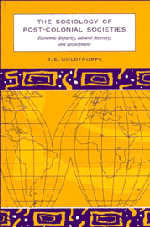Book contents
- Frontmatter
- Contents
- Preface and acknowledgements
- 1 Introduction and argument
- 2 Technology, society, and population
- 3 The colonial episode and the race question
- 4 Economic conditions
- 5 Environmental concerns
- 6 The social sciences and the ‘Third World’
- 7 The rise of towns
- 8 Family life in a changing world: two studies
- 9 Cultural diversity, language, education, and communications
- 10 Religion and development
- 11 Individual modernization: some psychological studies
- 12 Politics in post-colonial states
- 13 Aid and development
- Notes
- Index
5 - Environmental concerns
Published online by Cambridge University Press: 03 May 2011
- Frontmatter
- Contents
- Preface and acknowledgements
- 1 Introduction and argument
- 2 Technology, society, and population
- 3 The colonial episode and the race question
- 4 Economic conditions
- 5 Environmental concerns
- 6 The social sciences and the ‘Third World’
- 7 The rise of towns
- 8 Family life in a changing world: two studies
- 9 Cultural diversity, language, education, and communications
- 10 Religion and development
- 11 Individual modernization: some psychological studies
- 12 Politics in post-colonial states
- 13 Aid and development
- Notes
- Index
Summary
But is it possible? It is a much controverted issue whether the economic development of poor countries, and particularly their industrialization, can be carried to a level approaching that of rich countries without the world as a whole running into environmental constraints.
Thus Paul Ehrlich and Anne Ehrlich wrote in 1970 that most of the underdeveloped countries would never, ‘under any conceivable circumstances, be “developed” in the sense in which the United States is today. They could quite accurately be called the “never-to-be-developed countries”’. The earth was overpopulated already, as the limits of food production by conventional means had very nearly been reached. Indeed, ‘world agriculture today is an ecological disaster area’. It was already leading to loss of soil fertility and erosion, and was vulnerable to even minor natural disturbances. As for other resources, the annual production of such materials as iron, copper, and lead would have to be increased six- to eightfold if the world's population used them at United States rates. However, to bring the present world population up to United States standards of equipment – railways, automobiles, electric wiring, structural steel, etc. – would require the extraction and smelting of far greater quantities at far higher rates, ranging from 75 times as much for iron to 250 times as much for tin. Even if that were possible, the energy consumed might endanger the heat balance of the earth, with possibly disastrous effects on climate.
- Type
- Chapter
- Information
- The Sociology of Post-Colonial SocietiesEconomic Disparity, Cultural Diversity and Development, pp. 99 - 108Publisher: Cambridge University PressPrint publication year: 1996



